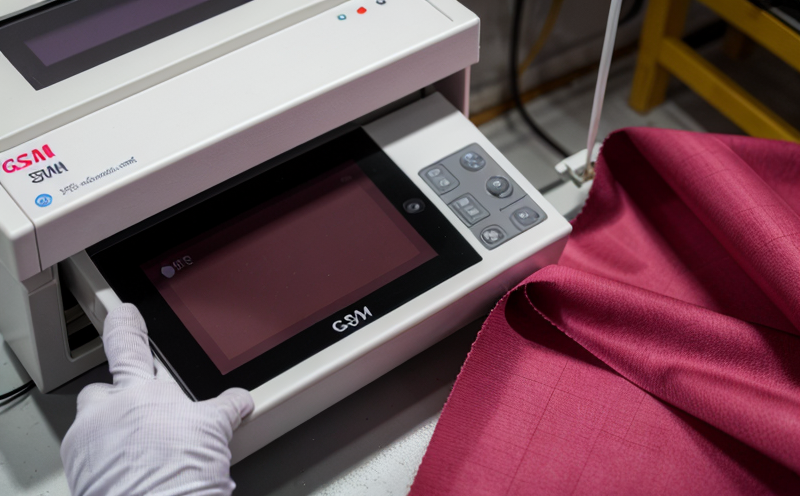OEKO-TEX Fabric GSM and Density Compliance Testing
The OEKO-TEX Standard 100 is a globally respected system for testing materials at all stages of production, ensuring they are harmless to human health. Within this framework, fabric GSM (Grammage per Square Meter) and density compliance testing plays a crucial role in guaranteeing that textiles meet strict ecological and toxicological criteria.
The GSM and density measurements are essential for quality assurance during the manufacturing process. These parameters directly influence fabric performance, durability, and overall aesthetic appeal. By accurately measuring GSM, we ensure that fabrics comply with OEKO-TEX standards, which is critical for brand reputation and customer satisfaction in an increasingly environmentally conscious market.
Our testing service covers a wide range of fabrics including cotton, polyester, blended fabrics, and other synthetic materials commonly used in the textile industry. We use advanced analytical instruments to measure GSM with precision down to 1 gram per square meter. The density measurement is equally important as it indicates how tightly the fibers are packed together. Proper density ensures that the fabric maintains its intended properties without compromising on comfort.
The testing procedure involves carefully selecting a representative sample of the fabric, preparing it according to specified guidelines, and then placing it onto a weighing platform for accurate GSM measurement. For density assessment, we use specialized equipment capable of capturing high-resolution images of the fabric, which are analyzed using sophisticated software algorithms. This allows us to provide detailed reports that include both quantitative data and visual aids.
Compliance with OEKO-TEX standards is not just about meeting legal requirements; it's also about building trust with consumers who expect sustainable and safe products. By offering this service, we help textile manufacturers ensure their fabrics meet these stringent criteria. This includes identifying potential issues early in the production process, thereby saving time and resources that would otherwise be spent on rectifying defects at later stages.
The importance of accurate GSM and density measurements cannot be overstated. They are key factors influencing fabric weight, thickness, and feel – all aspects that significantly impact consumer perception. Moreover, these parameters play a vital role in determining how the fabric will perform under various conditions such as washing cycles or prolonged wear.
Our comprehensive approach ensures that every aspect of the testing process is conducted with utmost accuracy and care. From sample preparation to final analysis, our team adheres strictly to international standards like ISO 5024 for GSM measurement and ASTM D3776 for density determination. These rigorous protocols guarantee consistent results across different batches or samples.
- Customer Impact: Ensures compliance with OEKO-TEX standards, enhancing brand reputation and consumer trust.
- Satisfaction: Saves manufacturers time and resources by identifying issues early in the production process.
Applied Standards
The OEKO-TEX Standard 100 is a globally recognized system that sets strict ecological criteria for textiles. Within this standard, there are specific sections dedicated to ensuring that fabrics comply with the required GSM (Grammage per Square Meter) and density limits.
For GSM compliance testing, we adhere strictly to ISO 5024:2019 'Textiles - Determination of grammage'. This international standard provides detailed methodologies for determining the mass per unit area of textiles. It covers various types of fabrics including woven, knitted, and non-woven materials.
Regarding density testing, ASTM D3776-20 is the primary reference document used in our laboratory. This American Society for Testing and Materials standard outlines procedures for measuring fabric density using image analysis techniques. The method involves capturing high-resolution images of the fabric sample under controlled lighting conditions before analyzing them with specialized software.
Both these standards emphasize precision and accuracy, ensuring that every measurement is reliable and repeatable. By following these internationally recognized guidelines, we can provide clients with confident results that align perfectly with OEKO-TEX requirements.
Customer Impact and Satisfaction
- Enhanced Brand Reputation: Compliance with OEKO-TEX standards assures customers that your products are safe for use, thereby enhancing brand reputation.
- Increased Consumer Trust: By ensuring fabric GSM and density meet the required levels, you can build stronger relationships with your target audience.
- Saved Time and Resources: Identifying potential issues early in the production process helps save time and resources that would otherwise be spent on rectifying defects later on.
Use Cases and Application Examples
In the textile industry, accurate GSM (Grammage per Square Meter) and density measurements are crucial for ensuring product quality. Here are some real-world applications where this service proves invaluable:
- Clothing Manufacturers: Ensuring that garments meet OEKO-TEX standards helps maintain a consistent level of quality across different batches.
- Furnishing Companies: By adhering to the correct GSM and density specifications, furnishing companies can produce high-quality upholstery fabrics that are both comfortable and durable.
- Sportswear Brands: Accurate measurements guarantee that performance wear maintains its intended properties during rigorous use.





